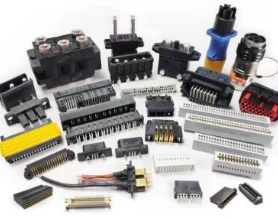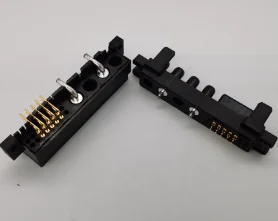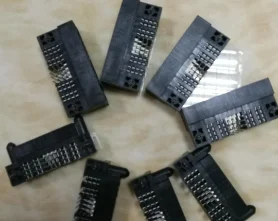MedlonUploaded:2024-02-27Browse:3732

Our innovative power connector series is designed to maximize efficiency and durability in all your power applications. Our connectors are built with the highest quality materials and are rigorously tested to ensure they can withstand the toughest conditions. Whether you need a connector for industrial, automotive, or household use, our series has you covered. With a wide range of options and the latest in technology, our power connectors are the ideal choice for powering your devices and equipment. Explore our collection today and experience the perfect combination of efficiency and durability. Trust us to keep your power running strong, no matter the task at hand.
Powering up your devices has never been easier with our top-of-the-line power connector solutions. We understand the frustration of constantly having to switch out cables and adapters just to keep your devices charged. That's why we have curated a collection of the best power connectors, ensuring compatibility with all your devices. Whether you're at home, in the office, or on the go, our connectors are designed to provide fast and efficient charging so you can always stay connected. Don't let a dying battery slow you down. Power up with our reliable and convenient power connector solutions today.

1.What are the different types of power connectors available in the market?
1. AC Power Connectors: These are the most common type of power connectors used for connecting devices to a power source. They come in various shapes and sizes, such as the standard 3-prong plug used in North America or the 2-prong plug used in Europe. 2. DC Power Connectors: These connectors are used for low voltage devices and are commonly found in electronic devices such as laptops, routers, and other small appliances. They come in various sizes and shapes, such as barrel connectors, banana plugs, and USB connectors. 3. Coaxial Power Connectors: These connectors are used for transmitting high-frequency signals and are commonly used in cable TV, satellite TV, and internet connections. They have a cylindrical shape with a center pin and an outer ring. 4. Twist-Lock Power Connectors: These connectors are commonly used in industrial and commercial settings where a secure and reliable connection is required. They have a locking mechanism that prevents accidental disconnection. 5. Miniature Power Connectors: These connectors are smaller in size and are commonly used in portable electronic devices such as smartphones, tablets, and cameras. They come in various shapes and sizes, such as micro USB, mini USB, and lightning connectors. 6. Audio/Video Power Connectors: These connectors are used for transmitting audio and video signals and are commonly found in home theater systems, gaming consoles, and other multimedia devices. They come in various types, such as HDMI, RCA, and VGA connectors. 7. Battery Connectors: These connectors are used for connecting batteries to devices and come in various types, such as snap-on connectors, screw terminals, and spring-loaded connectors. 8. Solar Power Connectors: These connectors are specifically designed for connecting solar panels to batteries or other devices. They are weatherproof and can withstand high temperatures and UV exposure. 9. Automotive Power Connectors: These connectors are used in vehicles for connecting various electrical components, such as headlights, taillights, and audio systems. They are designed to withstand high temperatures, vibrations, and other harsh conditions. 10. Waterproof Power Connectors: These connectors are designed to be used in wet or outdoor environments and are commonly used in outdoor lighting, marine equipment, and other outdoor applications. They have a waterproof seal to protect the connection from moisture and dust.
2.Can I use any power connector for my device or do I need a specific type?
It depends on the device and its power requirements. Some devices may have specific power connectors that are designed to fit only that device, while others may have more universal power connectors that can be used with a variety of devices. It is important to check the specifications of your device to determine the type of power connector it requires. Using the wrong power connector could potentially damage your device or cause it to not function properly.
3.Can a power surge damage a power connector?
Yes, a power surge can potentially damage a power connector. A power surge is a sudden increase in the electrical current flowing through a circuit, which can cause damage to electronic devices and their components. If the power surge is strong enough, it can overload and damage the power connector, causing it to fail or malfunction. It is important to use surge protectors to protect electronic devices from power surges.
4.Can I install a power connector myself or do I need a professional?
It depends on your level of experience and comfort with electrical work. If you have experience with electrical work and feel confident in your abilities, you may be able to install a power connector yourself. However, if you are unsure or inexperienced, it is recommended to hire a professional to ensure the installation is done safely and correctly.
5.Are there any regulations or standards for power connector manufacturing?
Yes, there are several regulations and standards that govern the manufacturing of power connectors. These include: 1. International Electrotechnical Commission (IEC) standards: The IEC sets international standards for electrical and electronic components, including power connectors. These standards cover aspects such as dimensions, performance, and safety requirements. 2. Underwriters Laboratories (UL) standards: UL is a global safety certification company that sets standards for electrical and electronic products, including power connectors. UL standards cover aspects such as safety, performance, and environmental impact. 3. Restriction of Hazardous Substances (RoHS) directive: This directive restricts the use of certain hazardous substances in electrical and electronic equipment, including power connectors. It aims to protect human health and the environment. 4. Registration, Evaluation, Authorization, and Restriction of Chemicals (REACH) regulation: This regulation aims to ensure the safe use of chemicals in products, including power connectors. It requires manufacturers to register and provide information on the substances used in their products. 5. National and regional standards: Many countries and regions have their own standards for power connectors, which may be based on international standards or have additional requirements. Manufacturers of power connectors must comply with these regulations and standards to ensure the safety, performance, and environmental impact of their products.

6.What is the typical cost of a power connector and do prices vary based on type?
The typical cost of a power connector can vary greatly depending on the type and quality of the connector. On average, a basic power connector can cost anywhere from $1 to $10. However, more specialized or high-quality connectors can cost upwards of $50 or more. Prices can also vary based on the type of connector. For example, a standard AC power connector may be less expensive than a specialized connector for a specific device or application. Additionally, the cost may also be affected by the brand and retailer from which the connector is purchased.
7.What is the difference between a power connector and an electrical socket?
A power connector is a device used to connect an electronic device to a power source, such as a wall outlet or power strip. It typically has two or three prongs that fit into corresponding slots in the socket. An electrical socket, also known as an outlet or receptacle, is a fixed device installed in a wall or power strip that provides a connection point for a power connector. It has slots or holes that match the prongs of a power connector and allows electricity to flow from the power source to the connected device. In summary, a power connector is the plug that goes into the socket, while the electrical socket is the fixed outlet that provides the connection point for the power connector.
8.How do I troubleshoot a loose power connector?
1. Check the power cord: The first step is to check the power cord itself. Make sure it is not damaged or frayed in any way. If it is, replace it with a new one. 2. Check the power outlet: Sometimes, the problem may not be with the power connector, but with the power outlet. Make sure the outlet is working properly by plugging in another device. 3. Tighten the connector: If the connector is loose, try tightening it with your fingers. If it still feels loose, use a small screwdriver to tighten the screws on the connector. 4. Clean the connector: Over time, dust and debris can accumulate in the power connector, causing it to become loose. Use a can of compressed air to clean out any dirt or debris that may be stuck inside. 5. Check the connection on the device: If the power connector is attached to a device, make sure the connection is secure. If it is loose, try tightening it or using a different connector. 6. Use a different power cord: If the power cord is the issue, try using a different one to see if it makes a difference. If the new cord works, then the old one may need to be replaced. 7. Consider using a stabilizer: If the power connector is constantly coming loose, you may want to consider using a stabilizer. This is a small device that attaches to the power cord and helps keep it in place. 8. Seek professional help: If none of the above steps work, it may be best to seek professional help. A technician can diagnose the issue and provide a solution, such as replacing the power connector or the device itself.
9.What is the typical length of a power connector cable?
The typical length of a power connector cable is around 6 feet (1.8 meters). However, the length can vary depending on the specific device and manufacturer. Some power connector cables may be shorter or longer, ranging from 3 feet (0.9 meters) to 10 feet (3 meters).
10.What is the average lifespan of a power connector?
The average lifespan of a power connector can vary greatly depending on the quality of the connector, frequency of use, and environmental factors. In general, a well-made power connector can last anywhere from 5 to 10 years. However, some connectors may last much longer, while others may fail after only a few years. It is important to regularly inspect and maintain power connectors to ensure their longevity.
